Some of the most successful brands have cracked the code of connecting with their customers in ways that old-school ads could only dream of. The secret weapon of their social media strategy? An outstanding content plan and high-quality content.
To keep your audience interested, you need to be making good-quality posts. This guide will show you how to create engaging social media content that will help you smash your business goals.
Why do you need social media content?
Creating brand pages on social media platforms is a piece of cake. But if you don’t post content regularly, your profiles will become an online graveyard with zero interaction or new followers.
Talking to your audience on social media should be about building a community. Your followers feel like they’re part of something, and it keeps your brand on the tip of their tongues. It also helps to boost your online visibility and turn followers into new leads or customers.
What is a social media content plan?
A social media content plan is a carefully considered marketing strategy for social media content that aligns with your brand’s identity, values, and goals. A well-executed content plan can boost your social media presence, increase brand awareness, generate leads, help new customers find your brand, and strengthen connections with your target audience.
It’s all part of a social media content strategy that aligns with your overall marketing goals.
There are many types of posts that can form part of your overall content marketing strategy. Here are some content creation options that could be useful for you when generating content ideas.
Types of social media content
When it comes to creating content, variety is the spice of life. You should always post new and interesting ideas that are relevant to your followers. Don’t be afraid to try different formats and see what grabs your followers’ attention.
Check out these popular content types to help you plan out cool ideas for engaging posts.
Photos
Posts with visual content can get more than double the engagement than just text posts. They give your followers a window into your brand and show them what you’re all about.
A photo can spark powerful emotions in your followers and inspire them to take action. A few on-point photos of your team can say more about your company culture than ten lines of text in the description. The rule is simple: show, don’t tell.
Pro tip: make sure your visuals match the theme of your post, have the right resolution and size for the platform, and stay true to your brand’s image.
Infographics
Infographics can be a good choice for social media posts. They have the winning combination of information, visual appeal, and shareability, which makes them highly engaging and impactful. Using infographics can help you capture attention, effectively convey your message, and foster meaningful interactions with your audience. You can get some handy templates for infographics online. Or if you have a graphic designer on your team, ask them to create original infographics based on your data or original research.

Memes
Memes are more than just funny pictures – they’re a legit communication powerhouse. Memes come in all shapes and sizes. They usually start with an image that perfectly captures an opinion or feeling that your audience can relate to.
Using the right memes in your social media strategy can inject some personality into your brand identity. Just make sure the memes you share aren’t inappropriate or offensive. Also, check that you are using them in the right context so that your brand image won’t be hurt.
Embrace the power of memes, add a touch of humor, and watch your brand become the life of the online party. After all, people go on social media apps for fun, not to be bombarded with sales pitches.

Live Streaming
When you go live on social media, you break down barriers between your brand and your audience. Forget about those pre-recorded, polished videos. We’re talking about raw, unfiltered interactions that make a genuine connection.
Live video streaming lets you communicate with your audience in real-time. It allows two-way interactions between you and your followers. Going live on social media builds transparency and trust with potential customers in a way that an edited, polished video never could.
It allows you to be true to yourself, showing a human side of your brand that your followers can connect with. You can live stream on most platforms, including TikTok, Instagram, Facebook, Twitter, LinkedIn and YouTube.

Short-form videos
Short-form videos (under three minutes) have been everywhere since TikTok exploded onto the social media scene. Facebook and Instagram have also jumped on the bandwagon by introducing their own short-form social video content with Reels. Using attitude captions for Instagram allows influencers to reinforce their brand tone and connect more deeply with their audience.
This bite-sized, ‘snackable’ content lets you communicate with your target audience without losing their attention. It’s shareable and engaging, and viewers get the message quickly.
The stats back it up too. A whopping 93% of consumers would rather dive into a short-form video to learn about a product or service. They’ve also got the highest ROI at a solid 39%.
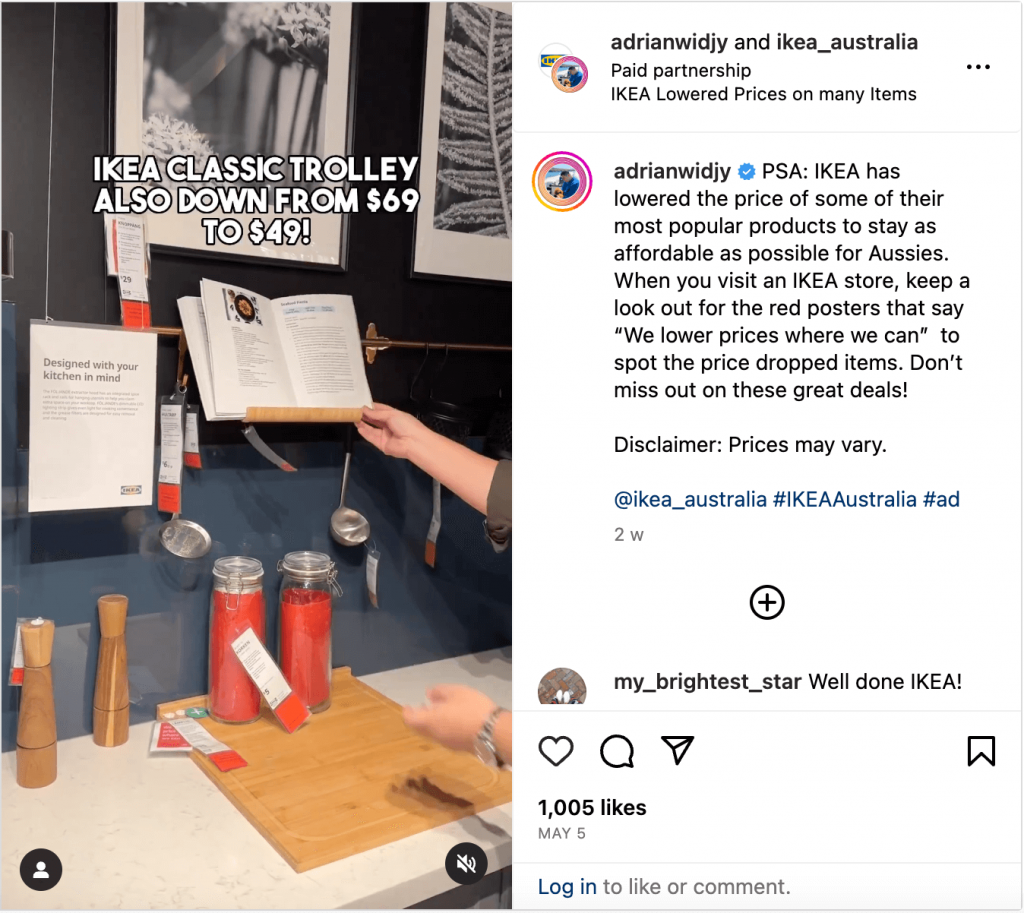
Long-form videos
Long-form videos (over ten minutes) are great for a detailed deep dive into a subject. Even with short videos ruling the social media world, there’s still a place for long-form content in your social media strategy.
Short-form videos provide quick hits of information, while long-form videos offer a more in-depth, immersive experience. It’s all about finding that perfect balance. TED Talks are wildly popular and they are almost always over 10 minutes. Their secret ingredient? Providing tons of value.
If you’ve got a lot to say, long-form videos are the way to go. Facebook Watch or YouTube are perfect for longer videos. They give you the perfect playground to unleash your educational content or share engaging interviews. YouTube even lets you embed those videos on your website without putting the brakes on your page speed.
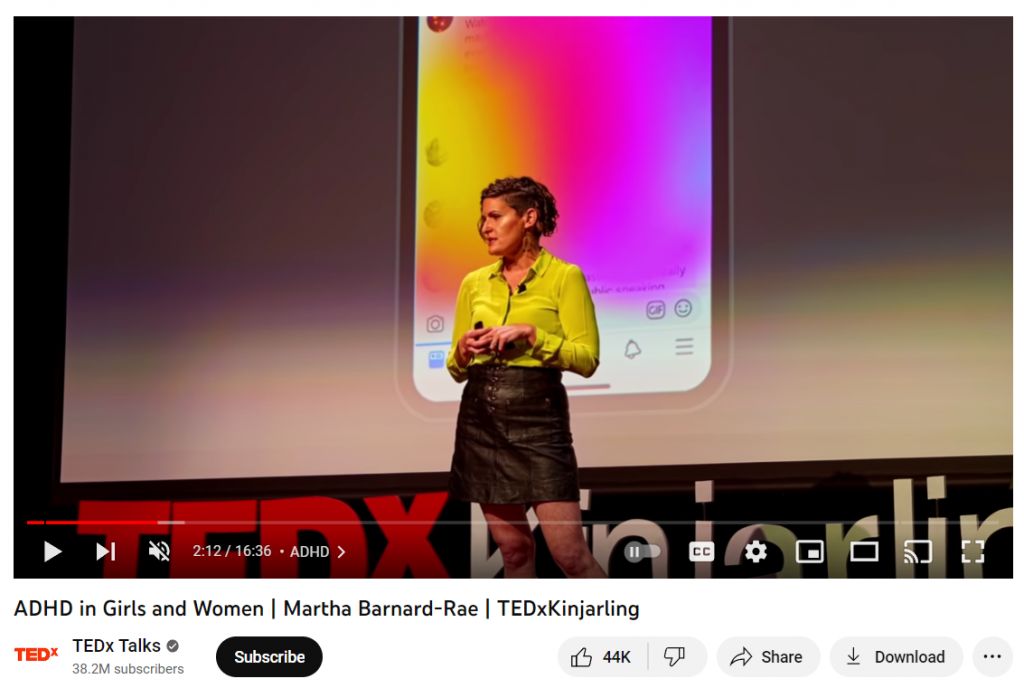
Webinars
Webinars can take your brand to thought leader status. It’s like having a virtual meetup where you share knowledge, answer customer questions, and practical tips. It’s all about giving your audience something useful—and leaving them hungry for more.
Webinars can help boost your overall credibility, show your expertise, and solidify your position as a go-to authority. You can record them and repurpose the content to make shorter videos for your social channels—double win.
Behind-the-scenes content
BTS (behind the scenes) content allows you to showcase authenticity. It provides your audience with a sneak peek into the inner workings of your company.
You can create BTS content by documenting a “day in the life” of you or your team. Or offer sneak peeks of new releases, backstage of your events, or show how you build your product.
Sharing behind-the-scenes content on social media builds trust and brand loyalty by showing that you, too, are human and relatable.

Blog posts and articles
Blog posts and other written content showcase your brand’s expertise in the industry. You can give your blog posts a new lease on life by sharing them across your social channels. To make the most of them, you can turn them into smaller snippets with actionable insights for social posts. Or simply use them as inspiration for engaging videos and podcasts.
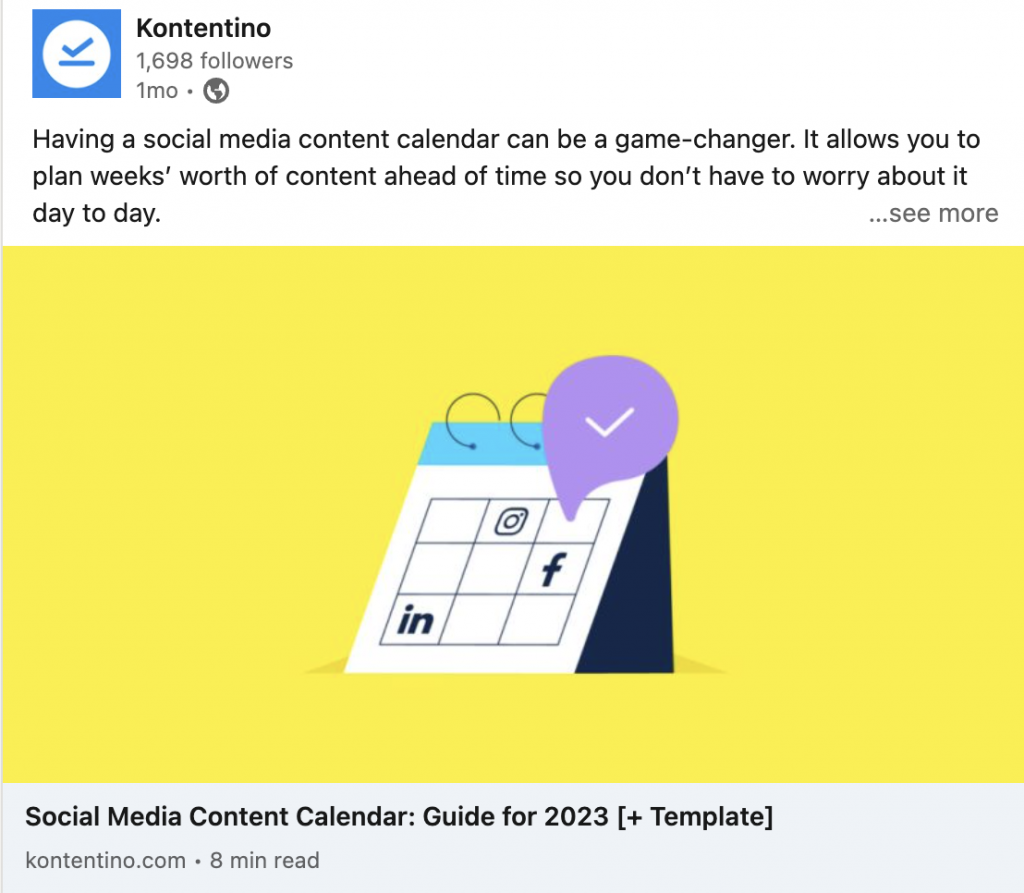
User-generated content
User-generated content can be your lottery ticket if you use it right. With an AI video generator, businesses can turn customer photos, reviews, and testimonials into professional-looking videos that drive engagement. In fact, asking your social media followers to share their own positive experiences with your product or service is the most powerful social proof you can ask for.
Invite your followers to send in photos or videos about how or why they use your product. Then feature them on your social media network. You can create a mini-series by asking everyone to answer the same question, for instance.
Although many happy customers will do it if you ask nicely, try to offer an incentive to get more people involved.
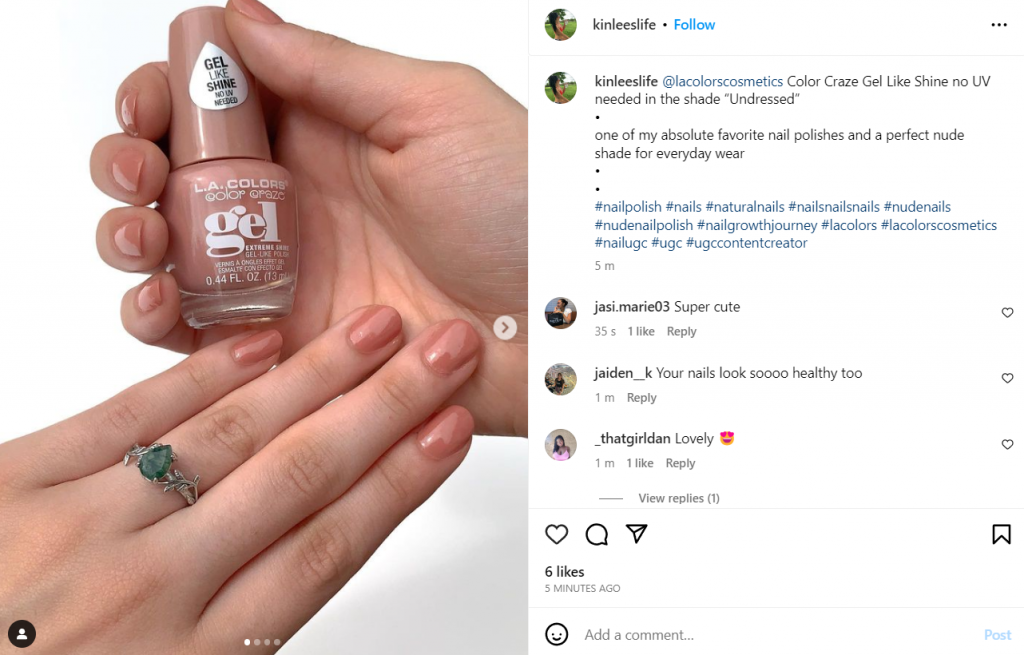
Contests and challenges
You can boost your engagement by holding social media contests or challenges. This way, your followers can help spread the word about your brand, especially when they might win a prize.
As an incentive, choose something practical and relevant to your industry. For a health and fitness brand, a wonderful prize would be some exercise gear or a hamper of healthy snacks.
Don’t forget to check each social media platform to make sure you follow their rules for competitions.
Polls and surveys
Ask your audience questions using polls or surveys on social media to increase your engagement and find out what your followers think. Asking for their opinions and listening to their feedback will make them feel valued.
Polls can apply to your products or services, or they can be just for fun! You can even collect content ideas by asking your followers what they’d like to see on your channel.

Podcasts
Many brands use podcasts as a way of sharing their knowledge on industry-specific topics. It’s a way of promoting your products and services while providing some value.
If you have a podcast, you can share teaser clips of your podcast on your social media accounts. This helps attract listeners and gives your audience a chance to learn something new.
Filming your podcast episodes means you can repurpose them into video posts, such as Instagram Reels or YouTube Shorts. And don’t forget to sprinkle those “a-ha” moments from your popular episodes into text-based social posts.
A nice way to ramp up reach and engagement is by sharing podcast episodes with special guests from the same niche. And don’t forget to tag your guests in your posts, so they can give you an extra boost by sharing it on their own social channels.
How to create social media content in 6 steps
Start with research
Start by understanding your target market. Who are they? Where do they hang out online? What content do they like? How do they communicate? What keeps them up at night? And how can you help them? Answer these questions first to make sure you truly “get” them.
Keep an eye on your competitors’ social media game too. Look at what they’re doing—their topics, their vibes—and especially what they’re not talking about.
Don’t forget to stay in the loop with the latest online trends, too.
Set SMART goals
Let’s get SMART. This stands for Specific, Measurable, Attainable, Relevant, and Time-bound.
Clear goals help you keep things in check and meet your targets. When you know where you’re headed and you’ve got a plan with measurable milestones, success is within reach.
Examples of social media SMART goals:
- Doubling your followers’ count within 6 months
- Getting 5 times more leads from your social channels than in the previous quarter
- Increasing sales through Facebook Shop by 20% by September 2023
Create a content calendar
A content calendar is where you plan, schedule, and organize content for your social channels. It lets you create posts or even entire campaigns in advance, keeping you on top of your goals.
You can include information such as publishing date, type of post, hashtags or mentions you want to include, which theme it falls into, or who is responsible for scheduling it. You can also add images, captions, links, videos, and more.
A well-designed content calendar will help you manage content on all your social channels and plan a consistent social media presence.
Here’s an example of what a content calendar may look like:
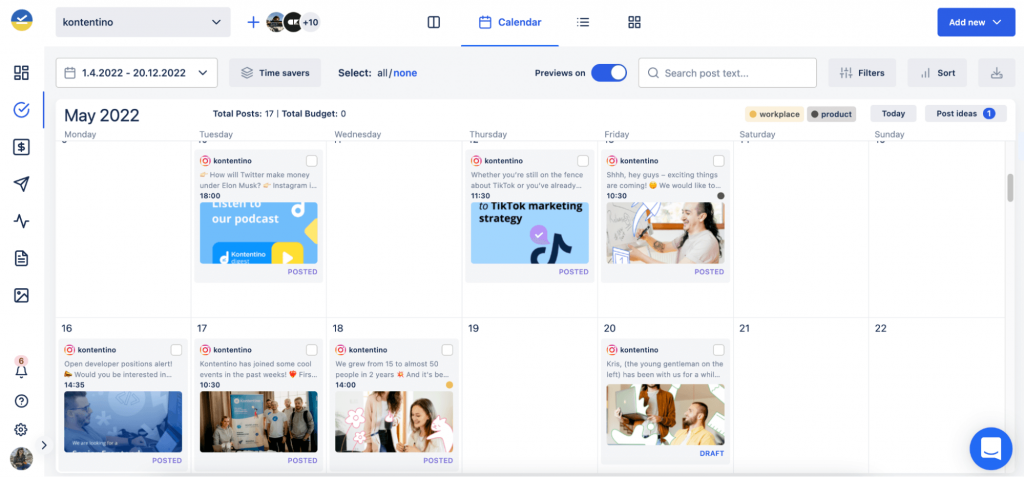
Schedule your content in advance
Scheduling posts in advance is a great time saver. Instead of having to publish posts manually several times a week, you can spend a few hours scheduling your content for the weeks ahead.
It also lets you be more strategic about posting your content and gives you enough time to collaborate with colleagues or clients on campaigns. You can line up your posts to match upcoming events like product releases, webinars, industry dates, and holidays.
Scheduling lets you set up sharing the same post at different times on different channels. For example, Instagram might have different ideal posting times than Facebook and LinkedIn. Test out different posting times, monitor your results, and see what works best for you.
Don’t be afraid to mix it up and try new things. Remember, experimenting is the name of the game. It’s all about finding out which posts make the biggest impact, and when.
Build a content library and templates
A content library gives you a collection of post ideas that you can dip into anytime. This could be a simple spreadsheet or a whole virtual library. You can use it to store content that you’d like to share later or keep for inspiration.
Kontentino’s Media Library is a great example of having one place to store all your visual assets. It lets you upload and save images and videos to use in future posts. You can use the inbuilt editor to tweak your photos, and adjust the size and aspect ratio to suit different platforms.
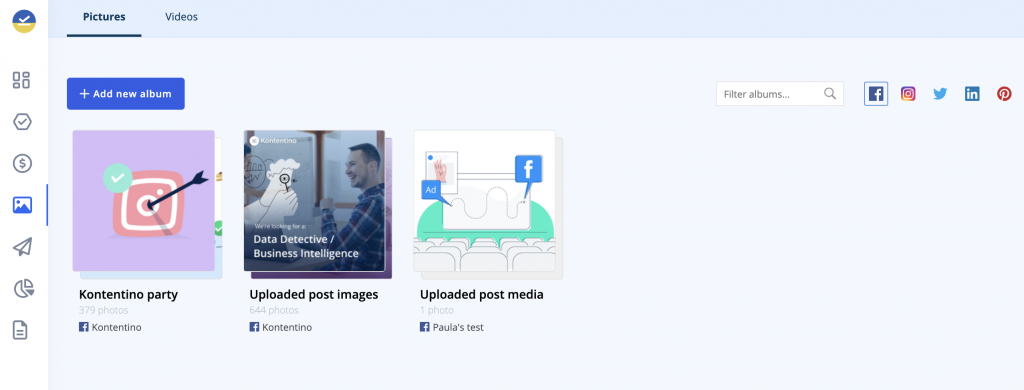
Templates are super useful when batching content. If you have an in-house style for your posts, then using a template helps you create content quickly and easily. This can be a graphical template or a text-based one that includes hashtags. Both are excellent time-savers for your content creation process.
Analyze your results
Analytics are essential for knowing if your social posts are hitting the mark. Tracking them helps you stay on top of your SMART goals; it gives you an overview of what’s working and what’s not. It’s like having a compass to navigate the social media jungle.
Social media analytics can:
- Tell you what your audience actually cares about
- Let you create more relevant content
- Teach you more about customer behavior and habits
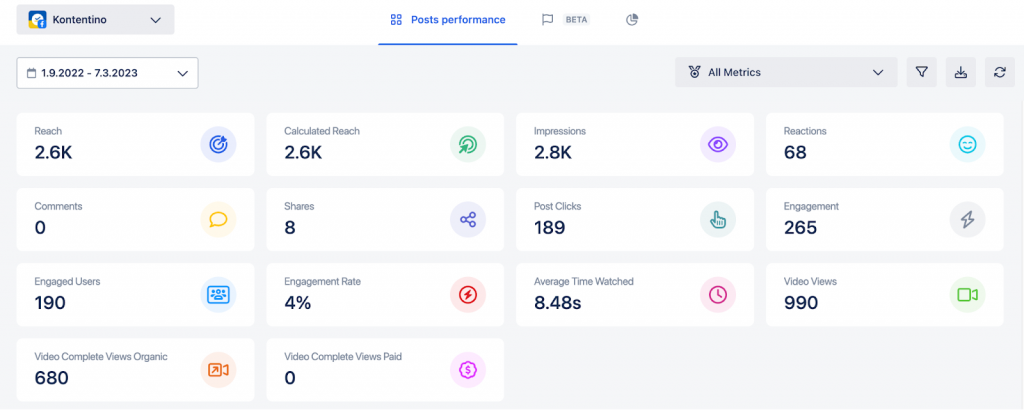
A good social analytics tool is the secret to unlocking the power of your posts and crushing those key performance indicators (KPIs). Analytics can provide you with valuable insights for your social media marketing strategy. For instance, which posts get the widest reach or what content drives the highest engagement. Dig deep into your posts’ performance, find out what your followers enjoy most, and tweak your content to align with your goals.
Top 5 tools for social media content creation
Here are five game-changing social media tools that’ll take your content creation process to a whole new level.
1. Kontentino
Kontentino is a social media management platform that includes all the features you need to stay on top of your social posts. Some of the tool’s top features include:
- Content calendar: This lets you plan out content for all your social media channels. Store assets in the media library, save post ideas for later, and save time with templates and presets. Label your posts so you can easily filter them within the calendar.
- Scheduling: You can schedule your content weeks in advance in a single click, with live previews for each post. This feature also lets you easily reschedule, copy, or move your content across multiple channels by dragging posts within the calendar.
- Collaboration: Share the content creation workload with your team. Assign tasks to colleagues and add post checklists to ensure nothing slips through the cracks. You will get notified once they mark their tasks as “Done”. Plus, you can send content to clients for approval, where they can provide feedback and accept or reject posts within the platform.
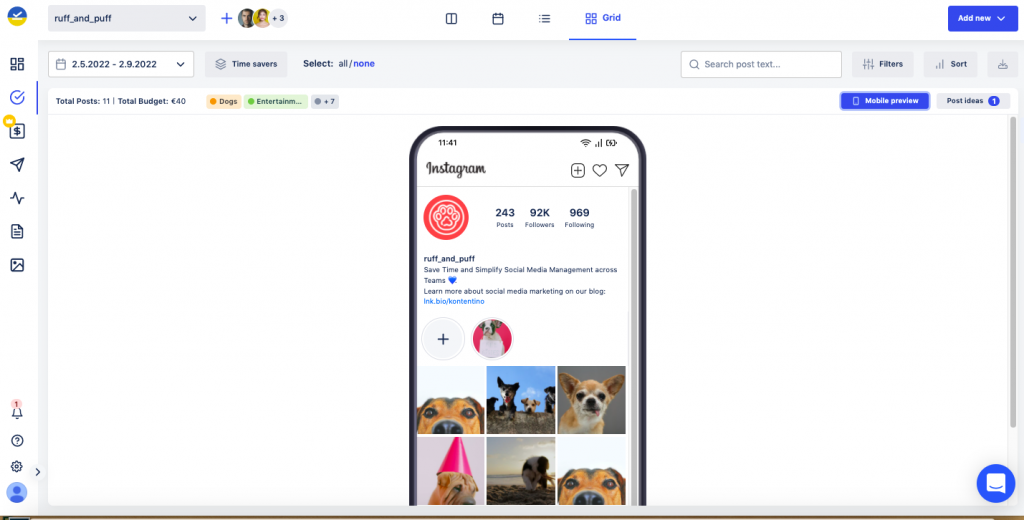
2. Canva
If you want a simple tool for design work, Canva is your friend. It’s one of the most popular content creation tools. With its arsenal of stock images, assets, and a sea of templates, you’ll be creating eye-catching social media visuals in no time. It’s like having a design studio at your fingertips. You can easily work together with your team, or share designs with your clients.
Canva offers:
- A simple interface for beginners and more experienced designers
- The chance to upload your brand assets, such as logos, colors, and fonts
- Customizable templates—tweak fonts, images, and layouts to match your brand’s style
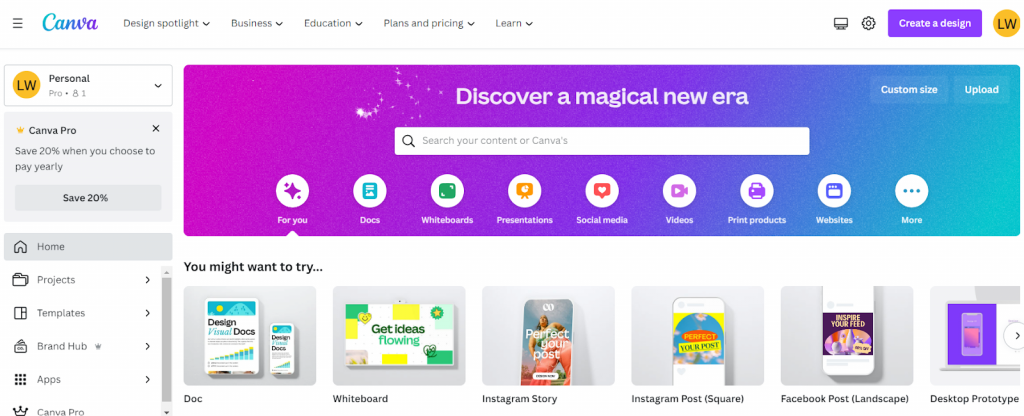
3. ChatGPT
Need to research a topic? Looking for inspiration for your social media content strategy? The popular AI tool, ChatGPT, can summarize articles and turn them into engaging social media posts and captions.
It’s like having a content curator right at your fingertips. If you’re feeling stumped, it can help spark ideas and provide suggestions for relevant hashtags, or even help you craft a whole social media calendar.
But beware: ChatGPT can make mistakes. That’s why it’s crucial to fact-check and edit any content it generates.
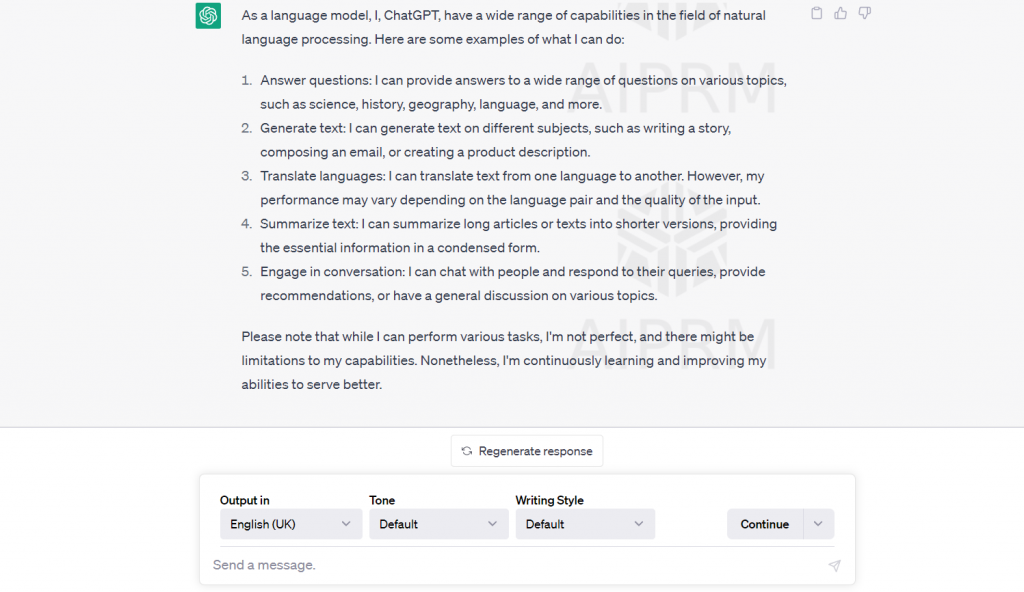
4. Kapwing
Kapwing is the ultimate browser-based video editing tool. While it may not have all the advanced bells and whistles of a full-fledged video editor, Kapwing provides all the essential tools you need to create captivating content.
Their subtitle wizard feature is a real time-saver, as it pulls subtitles right from your video’s audio track. No more manual typing or syncing required.
But that’s not all. Kapwing is perfect for optimizing your videos for different social media platforms, making sure your content looks flawless on TikTok and beyond.
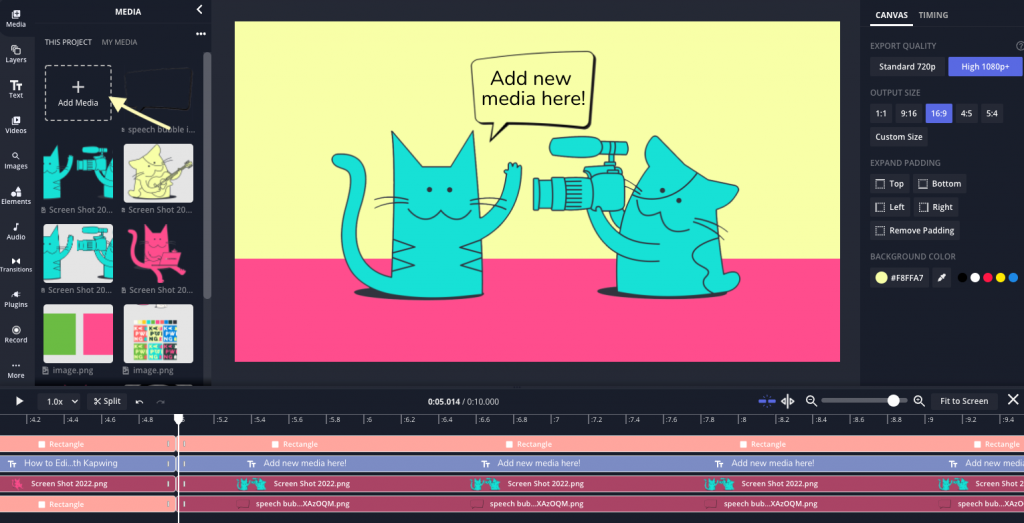
5. Podbean
Podbean is your all-in-one solution for podcast hosting, live streaming, recording, and publishing. This incredible tool has everything you need to bring your podcast to life.
With Podbean, you’ll have seamless distribution options at your fingertips. Simply upload your podcast, and Podbean takes care of the rest, ensuring your episodes show up on Spotify, Apple Podcasts, Google Podcasts, and more. It’s hassle-free and saves you valuable time.
Not only that, but Podbean makes it a breeze to share your episodes on your social media channels. Amplify your podcast’s reach and connect with listeners like never before.
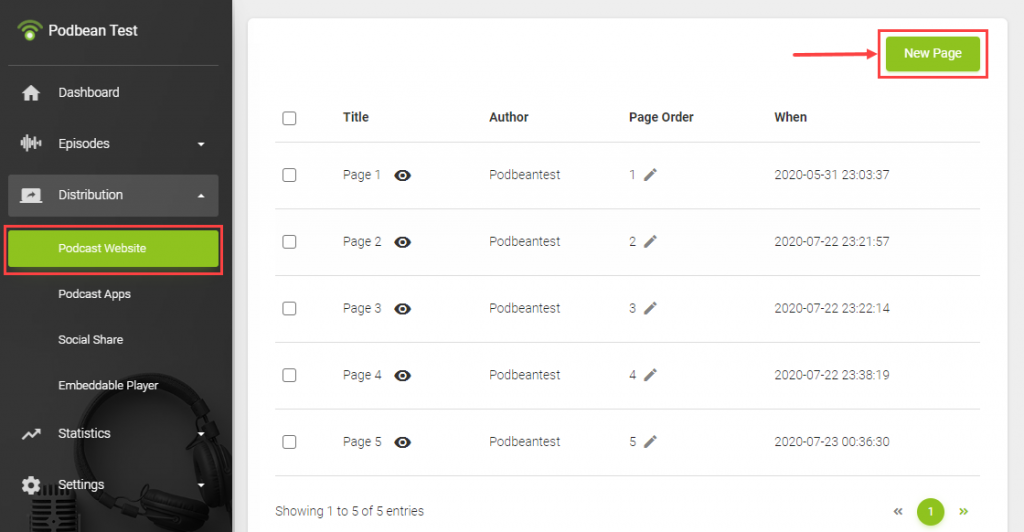
How to Create Social Media Content Like a Pro
Get ready to master the world of social media and take your social media content strategy to the next level. Armed with these tips and powerful tools, you have the ultimate arsenal to craft amazing content that resonates with your target audience. Don’t be shy about experimenting and remember to track your success using analytics. Make sure you bookmark this guide for quick reference whenever you need a creative boost.




